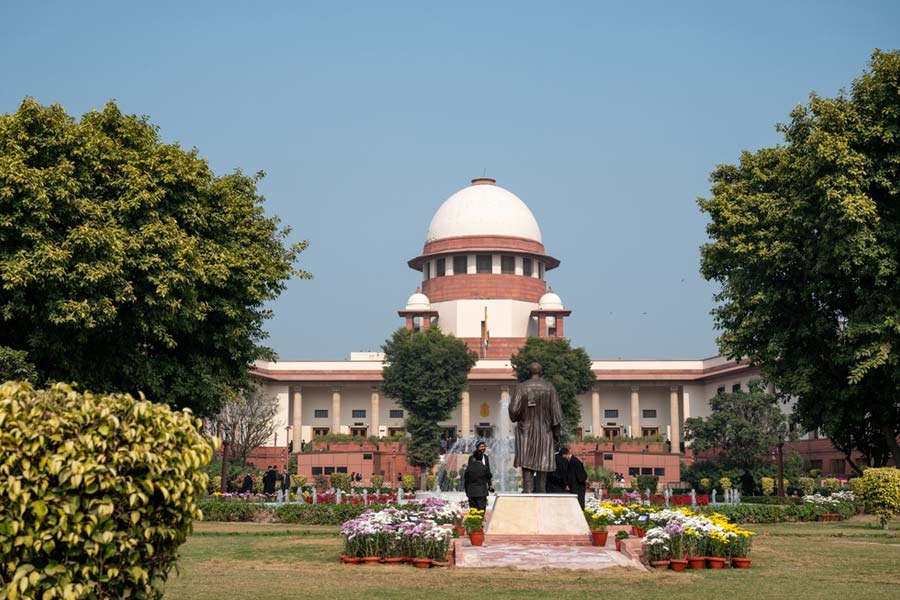The Supreme Court on Wednesday ruled that under the Hindu Marriage Act, 1955, a husband or wife is entitled to permanent and temporary alimony even if the marriage is eventually declared void.
A marriage illegally performed by ignorance, concealment, coercion or fraud is termed void in legal parlance.
A three-judge bench of Justice Abhay S. Oka, Justice Ahsanuddin Amanullah and Justice Augustine George Masih passed the verdict while laying down the law and overruling a catena of judgments passed by various high courts and also two-judge benches of the Supreme Court taking a contrary view.
The present case relating to a matrimonial dispute between the husband, Sukhdev Singh, and wife, Sukhbir Kaur, was referred to the three-judge bench for an authoritative pronouncement by a two-judge bench in August last year because of conflicting verdicts on the issue.
The husband had taken the plea that there cannot be any direction for interim or permanent maintenance/alimony to either of the spouses when a marriage is declared void.
The counsel for the husband had pointed out that there can be void marriages between father and daughter, brother and sister and grandfather and granddaughter. He questioned whether, in the case of such marriages, after it is declared void, the court can exercise power under Section 25 of the 1955 Act to grant maintenance.
It was submitted that there would be cases where parties to void marriages are conscious of the fact that their marriage would be bigamous. There would be cases where the wife may be responsible for concealing her first marriage, which is in subsistence, and induce the husband to marry. There may be cases where both parties may be unaware that they are solemnising a void marriage. He submitted that it is absurd to include a decree.
He submitted that a marriage declared void under Section 11 is void ab initio, which does not exist. He would, therefore, submit that Section 25 of the 1955 Act cannot apply to a spouse whose marriage is declared void.
Justice Oka, who authored the judgment, said the remedy under Section 25 of the 1955 Act is completely different from the one under Section 125 of the CrPC. Section 25 of the Act confers rights on the spouses of the marriage declared as void under Section 11 of the 1955 Act to claim maintenance from the other spouse.
“The remedy is available to both husband and wife. The principles which apply to Section 125 of the CrPC cannot be applied to Section 25 of the 1955 Act. The relief under Section 125 of the CrPC can be granted to wife or child and not to husband,” Justice Oka observed.
He added: “A grant of a decree under Section 25 of the 1955 Act is discretionary. If the conduct of the spouse who applies for maintenance is such that the said spouse is not entitled to discretionary relief, the court can always turn down the prayer for the grant of permanent alimony under Section 25 of the 1955 Act.
“Equitable considerations do apply when the court considers the prayer for maintenance under Section 25. The reason is that Section 25 lays down that while considering the prayer for granting relief under Section 25, the conduct of the parties must be considered.”
The court laid down the following law:
n A spouse whose marriage has been declared void under Section 11 of the 1955 Act is entitled to seek permanent alimony or maintenance from the other spouse by invoking Section 25 of the Act. Whether such a relief of permanent alimony can be granted or not always depends on the facts of each case and the conduct of the parties.
n Even if a court comes to a prima facie conclusion that the marriage between the parties is void or voidable, pending the final disposal of the proceeding under the 1955 Act, the court is not precluded from granting maintenance during litigation,
provided the conditions mentioned in Section 24 are satisfied. While deciding the prayer for interim relief under Section 24, the court will always take into consideration the conduct of the party seeking the relief, as the grant of relief under Section 24 is always discretionary.










